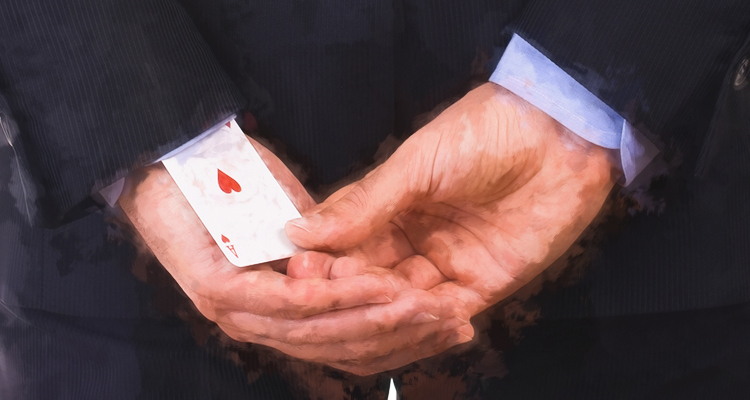Cheating at cards

Mark Pilarski 02:56 Sep 1st, 2006
Those highly skilled lowlifes and how to spot ‘em Dear Mark, Regarding cheating at casinos and cards, what is a mechanic? Anonymous
Dear Anonymous;
Regarding the postcard you sent incognito with personal and confidential penned on the bottom, I’m kinda hoping that this isn’t a career move on your part. And yet, since inquiring minds besides yourself probably want to know, cheating at cards can be done a whole host of ways, such as collusion, sleight-of-hand movements like bottom stacking the deck, the use of physical objects such as marked cards, cold decks or holdout devices. A card mechanic, or card sharp -- not to be confused with card shark -- is a card cheat who specializes in sleight-of-hand card manipulation. You’ll find this handiwork employed by most magicians who, like a card sharp, try to keep track of, sometimes, just one specific card, and other times, the order of a complete deck. No need or space here for wholesale writings on different forms of sleight-of-hand cheating techniques like false shuffles, false cuts, hand mucking, etc., but I will mention one that anyone with just a little practice might be using against you at a not-so-friendly kitchen table poker game, and that one is “dealing seconds”.
Dealing seconds is manipulating either the second card from the top, or the bottom card, instead of the customary top one. This stunt is also called "second deal" or "bottom deal" respectively. Any deuce dealer with a little practice can deal the second card, the bottom card, the second-from-bottom card, even the middle card without an untrained eye spotting what’s going on. Someone of masterful hand dexterity could even “cull”, meaning finding the cards he needs, placing them at the bottom, top, or any other place the cheat fancies, then falsely dealing them to himself or to a confederate player on the game. You can identify a seconds-dealing pagan in your home-game village by looking at how the deck is gripped. A card manipulator will use what is known as the "mechanic's grip," a handclasp of the cards that makes it easier to deal not only seconds, but from the bottom, or even from the middle of the deck. A right-handed dealer holds the deck in his left hand, three fingers on the edge of the long side of the deck, and the index finger on the outer right corner. Certainly a mechanic's grip alone is not enough proof to accuse anyone of being a double-dealing sharper, and you never want to get involved in a cockeyed game where cheating is going on, unless, of course, you are of the mind-set of legendary gambler Canada Bill. Bill was losing his entire bankroll at Faro when a friend approached and said, "Bill, don't you know this game is crooked?" "Yes," answered Canada Bill, "but it's the only game in town."
| Gambling Wisdom of the Week: “It's hard work. Gambling. Playing poker. Don't let anyone tell you different. Think about what it's like sitting at a poker table with people whose only goal is to cut your throat, take your money, and leave you out back talking to yourself about what went wrong inside.” --Stu Unger, Three-time WSOP Champion |
On This Page



